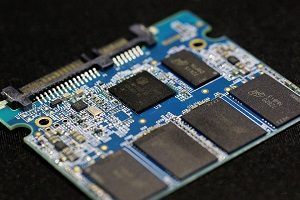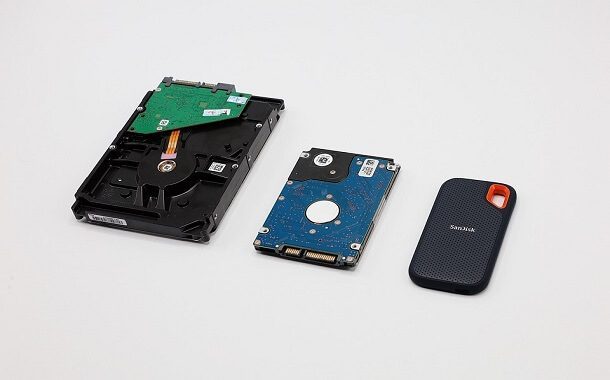Hard Drive Cost
Last Updated on December 29, 2023
Written by CPA Alec Pow | Content Reviewed by ![]() CFA Alexander Popinker
CFA Alexander Popinker
Hard disks have long been the most reliable data storage solution, offering ever-increasing storage capacities but also working speeds that keep up with the latest computing technologies, being also the basic layer of the Internet by supporting the huge amount of data that is generated and transferred daily on the Internet and in the cloud.
Internet users: Twitter, Facebook, Netflix, Youtube, Instagram, email, and other applications, generate an average of 2.5 billion GB of data daily that would require over one million 2TB hard drives for storage, every day. There is no doubt that HDDs are best suited for this task, having no rival when it comes to the price per gigabyte of information and the versatility they offer.
How Much Does a Hard Drive Cost?
The Hard Drive cost is influenced by many factors including the type, the capacity, where you buy it from, the device, and the brand. For instance, you will have to pay anywhere between $110 and $170 for a 1TB HDD hard drive which can be connected to a USB port. Also, the price of an internal HDD hard drive of the same capacity which can be connected using a SATA cable inside the computer starts at $90 and goes up to $180. But, for an HDD hard drive with a capacity of 2TB, you will pay around $220.
Expect to pay anywhere between $65 and $155 for an internal HDD hard drive with a capacity of 1TB, while for an internal HDD hard drive with a capacity of 500-gigabytes you will pay anywhere between $45 and $70. As the capacity is smaller the price decreases. For example, a 250-gigabyte HDD internal hard drive cost anywhere between $40 and $60.
When comparing the prices of laptop hard drives with the rest, usually these will be similar to those for desktop computers.
You might also like our articles about the cost of a laptop, Mac, or the cost to have your PC repaired.
For an SSD drive, that is faster at writing data than the traditional HDD drive, you will pay anywhere between $95 and $150 for a drive with a capacity of 250 to 500 gigabytes.
Depending on the brand and capacity, the price of a portable hard drive, that can be moved from one computer to another, starts at around $80 and goes up to $210.
Also, depending on the capacity, for a hard drive designated for a gaming console like the Xbox 360 you will pay anywhere between $25 and $55. For example, the PlayStation 3 HDD can be purchased for almost $35. It must be said that the majority of these hard drives have to be bought used because the console is outdated.
Surprisingly, the price of a MacBook hard drive will be cheaper than the one used for a Windows-based computer. The majority of the MacBook hard drives with a capacity of 500GB cost $65 to $90. For example, for a 1TB iMac hard drive replacement you will pay $160 to $210.
Hard drive details
The form factor is the size of the hard disk. There are two form factors: 2.5 inches and 3.5 inches. 2.5-inch hard drives are more compact. They are designed to be used in laptops. You don’t have to buy a 2.5-inch hard drive to install it on your regular computer. 3.5-inch models are suitable for regular computers. They are faster, more reliable, and have a higher capacity at the same price.
The internal hard disk drive is designed to work inside the CPU. We can remove an internal hard drive from the central hard drive and connect it to another compatible drive, but this is not a practical solution as hard drives are shock-sensitive devices. External hard drives are available for transferring large amounts of data and for portability. They encapsulate an ordinary 3.5 or 2.5-inch hard drive in a box and are usually made of metal or even plastic.
Older hard drives used the IDE port to connect to the computer’s motherboard, but now most modern types of hard drives use the SATA interface. The latest version of SATA, called SATA III, is found on the latest motherboards and unlocks the fastest data transfer for an HDD.
Discs with speeds of 5400 rpm, 5900 rpm, 7200 rpm, and 10000 rpm are available today. If you do not know how to choose a hard drive, buy a model with a speed of 7200 rpm (rotations per minute). It is the best option. These disks are ideal for installing operating systems, programs, and games. Hard disks with a speed of 10,000 rpm are very fast, but they have a pretty high price. And at the same time, they do not stand out for their large capacity. These disks are used for specific tasks and are rarely used on home computers.
An SSD drive is the newest generation of storage used in computers. As the name suggests, an SSD drive has no moving parts. This type of device wants to replace the traditional mechanical hard drive with a flash memory (NAND), which is significantly faster and much quieter. The more NAND memory chips are there, the greater the storage capacity of the SSD.
What are the extra costs?
In case you need a professional to replace or install your hard drive be prepared to pay anywhere between $20 and $65.
Also, in case you need to restore data from a hard drive, it would cost around $1.25 per GB.
Important things to consider
 Hard disk capacity is measured in GB (gigabytes). (40 GB, 80 GB, 120 GB, 250 GB, 320 GB, etc.) Currently, there are hard drives of up to 15000 GB. That is 15 TB (15 terabytes).
Hard disk capacity is measured in GB (gigabytes). (40 GB, 80 GB, 120 GB, 250 GB, 320 GB, etc.) Currently, there are hard drives of up to 15000 GB. That is 15 TB (15 terabytes).
If you need 4 terabytes of storage, then you better buy two 2 terabytes hard drives. This will save you money and reduce the risk of losing all your data at once.
Currently, most external HDDs and external SSDs connect through the USB port. Avoid USB 2.0 drives, which transfer data at 25-30 MB/second, and instead choose USB 3.0 drives, which offer speeds of up to 100 MB/second.
If you use an Apple product, you can also choose an external storage device with a Thunderbolt 3 port, which was later integrated into the USB-C port. This type of port offers speeds of up to 40 Gbps, so it is 8 times faster than USB 3.0.
Compared to an HDD, SSDs are much faster, with transfer speeds even 10 times faster, very short access time, low power consumption – only 2-3 watts, have no disks or mechanical elements which move, are silent, but the price-per-capacity ratio is higher, along with their quality. Therefore, if you have to choose between a hard drive and an SSD, you need to know first what your priorities are.
Top brands to consider
- Seagate
- HP
- Western Digital
- Maxtor
- LaCie
How can I save money?
Take into consideration looking for promotions and discounts offered by online retailers.
In case you need a specific type of hard drive, use Google Shopping to compare prices offered my multiple shops.


Leave a Reply
Want to join the discussion?Feel free to contribute!